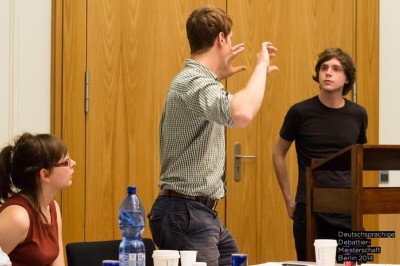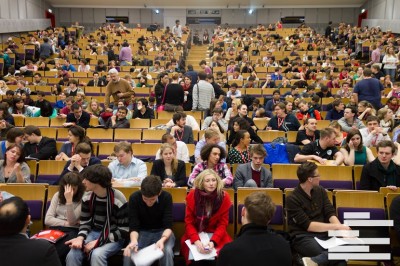Shortly after this year’s World Universities Debating Championship (WUDC) in Malaysia, Gemma Buckley wrote down her thoughts on the topic of discrimination based on language skills and the existing power structures in the debating community. Her article caused a broad debate on that issue on Facebook. She allowed the Achte Minute
to republish it on this blog. You can discuss it here or add a comment to the existing discussion.
Judging at this year’s WUDC was an eye opening (and occasionally devastating) experience for me, as has been made clear through my recent posts on Facebook. After many took offense to what I wrote or simply misunderstood it, I felt it was necessary to clarify my position – thus the inspiration for what follows. The issues that I have seen first hand throughout the course of my debating “career,” and which I have been vocal about in the recent years, remain unrecognised or ignored by those in positions of privilege. I intend to raise my voice louder than I have in the past, and hope others will join me, until someone finally listens and acts. I apologise in advance to those who find my attempts to fix something I think is broken (but truly value and love) confrontational or discomforting. With that said, I choose to prioritise the discomfort of those who continue to face overwhelming obstacles to have their merit recognised in the arena of debate.
For context, let me begin by talking about the things I experienced directly, or was told about by my students and friends this year at Worlds. Having never judged a Worlds before, I was personally shocked to encounter so many English speaking teams from institutions with strong reputations who expressed a palpable sense of entitlement to win – this extended so far as to actively ignore or misrepresent teams of the categories English as a Second Language (ESL) and English as a Foreign Language (EFL) that were in the room (to their own detriment) and become confrontational or express shock when I dared to explain to them why they had lost to a team they perceived as much weaker than themselves. For years I have been yelling at my friends and teams not to presume anything about the language status or quality of teams, and I was proud when many had complimentary things to say post judging or debating an ESL/EFL and/or unknown team.

Speakers of the first final in the category “German as a foreign language” at the German speaking debating Championship in Berlin 2014. © Matthias Carcasona
With that said, it still saddens me that these comments are always made in a context of surprise. In fact many people commented that they were “shocked” that Belgrade A had made the open semi final, despite having never seen the team debate and really having no idea of their quality at all, rendering their judgement exclusively based on presumptions about their institution and language capacities. Belgrade should be congratulated unconditionally for their amazing achievement and for being so talented that they could not be denied success. It is deeply regrettable that there is constant skepticism over the success of ESL and EFL teams – teams that are easily ignored when they don’t do well, with people presuming that they were not meritorious, and celebrated when they do manage to achieve success, so long as they don’t “overachieve.” To add to this, I heard reports of many judges being unwilling to give ESL and EFL teams high scores, as they had “given lower scores than that to [generic white university with decent reputation]”. Presumably some of those same judges were the ones who refused to offer ESL and EFL teams proper explanations for their results, believing it was self-evident why they had gotten the fourth. It is worth noting here that many judges who I know received consistently bad feedback from ESL/EFL teams they judged still broke and judged deep into the finals. I wonder at what point we as a community decide to take these things into account when recognising judges.
I want to introduce a caveat – by no means are these issues exclusively about language status. This discrimination is the product of an intersection of race, nationality, university reputation and actual or perceived language status. It is hard to define, no doubt, but that difficulty ought not prevent us from recognising its insidiousness. It also ought not to prevent us from acting to correct it.
The reaction of the vast majority of people to my agitation on this issue for the past few years has been to take one of two positions: Racism/discrimination does exist but I am not responsible for it, so therefore I cannot do anything, or racism/discrimination is very rare and occurs in equal degree to little known English speaking institutions. Despite years of debating about white privilege, many people continue to be unwilling to acknowledge these problems within the institution of debate. In the best case scenario, people are genuinely concerned, but believe these problems cannot be fixed, or unsure what to do about them.
I feel as though the inertia with regards to this issue can be easily explained by the fact that it just does not meaningfully impact the lives of those in positions of power within the global debate community. Take the action on gender pronouns as a counterpoint – this was an equity issue that gained traction in a circuit with influence and a solution was implemented almost immediately. I wonder how quickly action would be taken if historically successful institutions had to deal with the kind of aggravation and tragedy many ESL and EFL debaters face on a regular basis. That is not to question the merit of this change, but just merely to point out the power of certain parts of our community to make changes, and the failure of those outside the dominant culture (historically successful Western English speaking universities) to have their voices heard.

At international tournaments, teams with different language skills debate against each other. © Team Pretty Pictures
I believe that we can begin to move towards a world in which the best team in a debate walks out on top, regardless of where they come from, what they look like or how they sound. Many circuits have put huge amounts of work and resources into training and improvement to ensure their competitiveness (something that has really paid off for Asia this year for example), but the onus for a resolution should not simply be on those who are the victims of the status quo. Moves towards ensuring access at Worlds are also laudable – given a scholarship team won this year’s EFL division of Worlds, there ought to be no doubt that this programme is a key part of WUDC and should remain a priority for all future hosts. But something structural needs to be done to address this problem at its core. Many solutions have been offered, all of which I intend to open up for public comment about this year in my capacity as Worlds Council Equity Officer, with the intention of taking them to council in Thessaloniki. Some of them include:
- Opening up round seven and eight to ensure adjudicators are not able to easily disregard teams and are held accountable for their decisions
- Removing institution names from the tab to reduce judges’ pre-existing assumptions about the result and/or quality of the debate
- Allowing public feedback on judges as a form of accountability for those who consistently demonstrate these biases
- More thorough judge rotation in the rounds
- More regionally representative judging panels (a process which was begun this year at Malaysia WUDC)
At the most fundamental level, action of any sort requires everyone to recognise that there is a problem in the first place. Unfortunately, the calls of the victims of discrimination have fallen on deaf ears thus far. I hope that this post, and the subsequent forum that I will host for the world debating community, will draw attention to these problems, make people more confident to speak up, and convince those who benefit from this unfairness to prioritise what is right over what is convenient.
I welcome comments on this here or more preferably in the official forum, which I will open up very shortly. I have tagged people who I think will be interested/have opinions on this and the capacity to do something about it – apologies if I am wrong on that front. Hopefully this helps to clarify my rantings of late.
Attempting to sideline my statements or me with outraged responses and claims that I cause too much controversy will no longer suffice. In a zero-sum game, discrimination against some necessarily advantages others. It is understandable why many would be unmotivated to resolve these problems. It is understandable, but it is not acceptable.
Gemma Buckley/ama/hug
The Mittwochs-Feature: Every Wednesday at 10 am, the “Wednesday Feature” introduces an idea, a debate, a book or a person. If you want to kick off a debate, send us your proposal via email at team [at] achteminute [dot] de.
Gemma Buckley graduated from Monash in 2013 with a Bachelor of Arts. She debated for Monash for six years, during which she was the Vice President and President of the Monash Association of Debaters, the 2nd best speaker at Chennai Worlds and an Australasian Debating Championships finalist and top 10 speaker.








